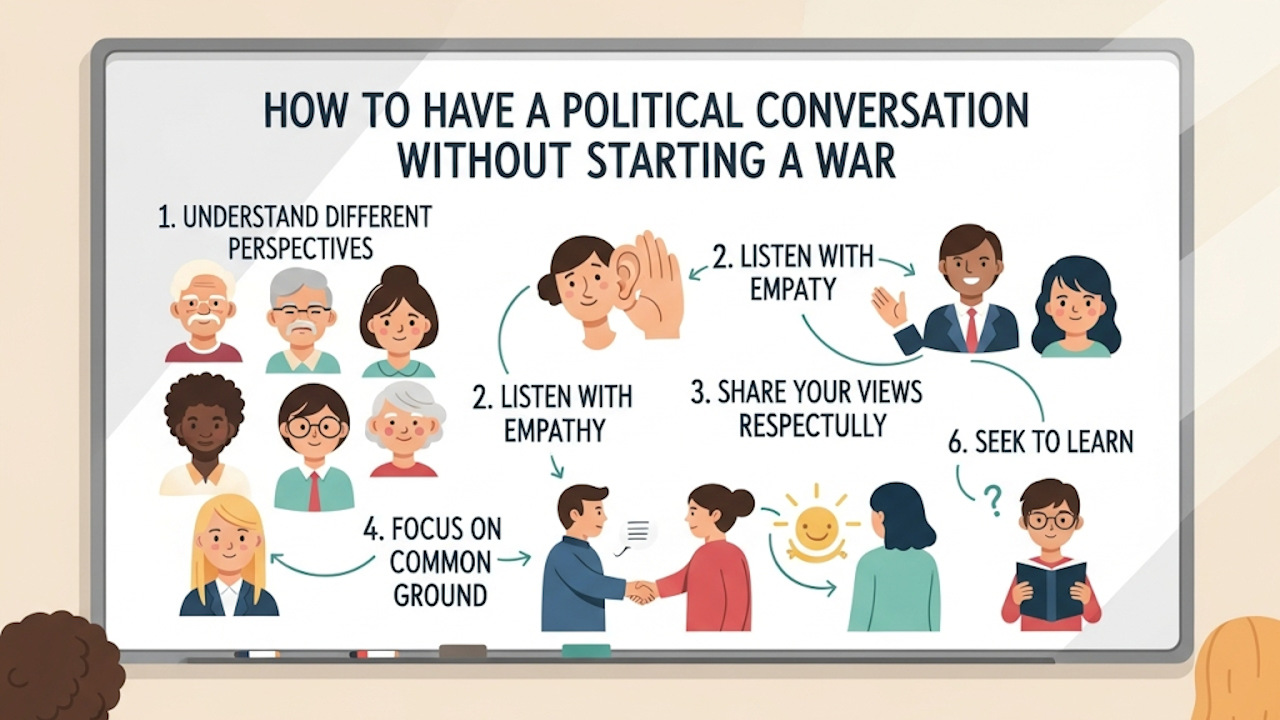In today’s polarized world, political conversations can feel like navigating a minefield. With the rise of social media, 24-hour news cycles, and divisive rhetoric, people are more passionate and entrenched in their views than ever. Unfortunately, this often leads to shouting matches, broken relationships, or complete avoidance of important issues. But political discussions don’t have to end in disaster. In fact, when approached thoughtfully, they can be enlightening and even bridge divides. Here’s how to have a political conversation without starting a war.
1. Start with Intentions, Not Assumptions
Before diving into a political discussion, ask yourself why you’re having it. Is it to understand someone else’s perspective? To share your own? Or is it to “win” an argument? Conversations rooted in curiosity tend to go much better than those aimed at proving a point. If both people enter the discussion hoping to learn or connect, the chances of conflict drop significantly.
At the same time, avoid making assumptions about the other person’s beliefs or motivations. Just because someone supports a certain policy does not mean they endorse every possible interpretation of it. Labels like “liberal” or “conservative” are often more limiting than helpful and can cloud understanding.
2. Listen to Understand, Not to Respond
This is one of the hardest but most powerful tools in a respectful conversation. Too often, people listen only long enough to prepare their rebuttal. Instead, focus on truly understanding what the other person is saying. Ask clarifying questions. Summarize their points back to them. You don’t have to agree, but showing that you understand helps build trust and shows that you respect their viewpoint.
Listening also reduces defensiveness. When people feel heard, they are less likely to double down on extreme positions and more likely to consider other perspectives.
3. Find Common Ground
Even if you disagree on major issues, you likely agree on some underlying values. For instance, people who disagree on immigration policy might both care about safety, opportunity, and fairness. Focusing on shared values instead of specific policies helps humanize the conversation and reminds both parties that you’re not enemies. You’re just people who see the world differently.
This doesn’t mean avoiding the tough topics, but rather approaching them from a place of mutual concern. It’s easier to discuss differences when you recognize the shared humanity in the person across from you.
4. Keep Your Tone Respectful
Words matter, but tone often matters more. A sarcastic, condescending, or hostile tone can derail a conversation before it begins. Even if your arguments are valid, delivering them in a way that feels like an attack is unlikely to be persuasive. Speak calmly. Avoid name-calling or generalizations. Say “I think” or “I feel” rather than “You always” or “You never.”
Also, pay attention to body language and facial expressions. Rolling your eyes or smirking sends a clear message, even if your words are polite. A respectful tone helps create a safe space where both parties feel comfortable being honest.
5. Know When to Pause
Not every political conversation needs to reach a resolution. Sometimes, it’s better to agree to disagree and take a break. If things get too heated, suggesting a pause can help everyone cool down. It’s okay to say, “This is getting a little intense. Let’s come back to it later.” Respecting emotional boundaries keeps the conversation healthy and prevents long-term damage.
Also, understand that not every setting is right for a political debate. Family dinners, workplace meetings, or public forums might not be the best time to dig deep into controversial topics. Timing matters.
6. Be Willing to Be Wrong
One of the most disarming things you can do in a political discussion is admit when you don’t know something or when you’ve changed your mind. It shows humility and creates space for honest dialogue. Nobody has all the answers, and being open to new information is a strength, not a weakness.
If you’re willing to reconsider your position, others may be more inclined to do the same. Even if you don’t shift your views, showing flexibility invites more thoughtful conversation.
7. Don’t Aim to Convert
You’re unlikely to change someone’s mind in a single conversation. That shouldn’t be the goal. The point is to share ideas, understand each other, and perhaps plant a seed for future reflection. Trying too hard to persuade someone can make them dig in their heels.
Instead, aim for mutual understanding. If both people leave the conversation feeling respected and thoughtful, that’s a win — even if nobody changes their stance.
8. Choose Your Battles
You don’t have to engage in every political debate that comes your way. Sometimes, walking away is the wiser choice. If someone is being intentionally provocative or refuses to engage in good faith, your time and energy are better spent elsewhere. Not every argument is worth having.
It’s also okay to protect your mental health. If certain topics or individuals always lead to stress, take a step back. Healthy boundaries are just as important as healthy conversations.
Political conversations are challenging because they deal with deeply held beliefs and values. But they don’t have to be hostile. By approaching them with curiosity, empathy, and respect, we can have meaningful discussions that bring us closer rather than push us apart. In a time when division often feels inevitable, choosing civility is a radical and necessary act.

